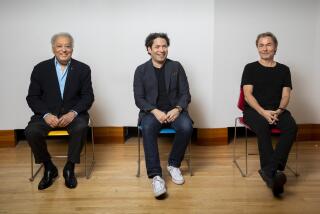MUSIC/DANCE : Going Bach to Their Roots
- Share via
What else would you expect the Brandenburg Collegium to play except Bach’s “Brandenburg” Concertos?
Plenty. The question isn’t as rhetorical as it sounds. The ensemble usually plays a range of music, from the Baroque to the early Romantic periods. Performing its namesake concertos, however, has almost become a special occasion.
“It doesn’t happen that often,” said group founder Anthony Newman. But for the group’s Philharmonic Society-sponsored concert Monday at the Orange County Performing Arts Center, the Collegium will bring its Bach scores.
“We were actually asked to do them,” the harpsichordist said.
Newman, a Los Angeles native born in 1941, formed the ensemble in New York in 1981 because it was difficult then for musicians who wanted to specialize in the Baroque period to get an audience. By promoting themselves, they were able to build a following.
“In London and Amsterdam, you could actually make your living as an original-instrument player,” he said. “But not in this country.”
So Newman assembled a group from the best and brightest, who played mainly in New York and Washington.
The “Brandenburgs” require that level of talent, so demanding and varied are the six concertos that Bach dedicated in 1721 to the Margrave Christian Ludwig von Brandenburg, who maintained his own orchestra.
The good margrave never deigned to listen to them, however. The scores were found after his death years later, still neatly tied with the original ribbon. They were evaluated at a liquidation auction to be worth the equivalent of about 10 cents each.
Nonetheless, they have long been known as the “Brandenburg” concertos. In fairness, the margrave may not have had an ensemble sufficient to address the variety of instruments that Bach called for.
Though all are essentially in three movements, each concerto showcases a different combination of instruments, in addition to a larger ensemble of strings.
While the Collegium sometimes plays with as many as 30 musicians, only 16 will be on hand for the “Brandenburgs.” The musicians will perform with modern instruments, although “we do use gut string on the fiddles,” Newman said.
“The problem (with original instruments) is the brass, which is so rarefied you can hardly find players who can do it. I’m delighted with modern instruments. There are more right notes.”
They reserve original instruments for recordings, where the small sound can be better controlled.
While best known as a harpsichordist, Newman is also an organist, pianist, conductor and composer. In the late ‘50s, he began studies in Paris with organist Pierre Cochereau and pedagogue Nadia Boulanger at the Ecole Normale de Musique. After returning to the United States in 1962, he studied with, among others, Leon Kirchner and Luciano Berio at Harvard.
Not surprisingly, he is enthusiastic about the trend toward authentic performances, which have come to dominate the early-music scene over the past decade.
“If, 20 years ago, you would have listened to a record of works by Palestrina or Tallis--late Renaissance people--you would have found the music unintelligible or boring. Until you heard the Tallis Scholars, you didn’t know what it sounded like, it’s so completely different and beautiful sounding.
“To some degree, that happened to Baroque music, too. Once you’ve heard Bach and Handel (played that way), it’s hard to imagine it in another way. You can argue with it. But it does have a sheen and revelation about it that is indisputable.”
What: Anthony Newman and the Brandenburg Collegium.
When: Monday, Jan. 23, at 8 p.m.
Where: The Orange County Performing Arts Center, 600 Town Center Drive, Costa Mesa.
Whereabouts: Take the San Diego (405) Freeway to Bristol Avenue and exit north. Take Bristol to Town Center Drive and go right.
Wherewithal: $17 to $45.
Where to call: (714) 553-2422.
More to Read
The biggest entertainment stories
Get our big stories about Hollywood, film, television, music, arts, culture and more right in your inbox as soon as they publish.
You may occasionally receive promotional content from the Los Angeles Times.










